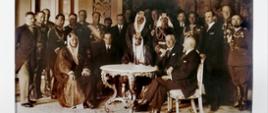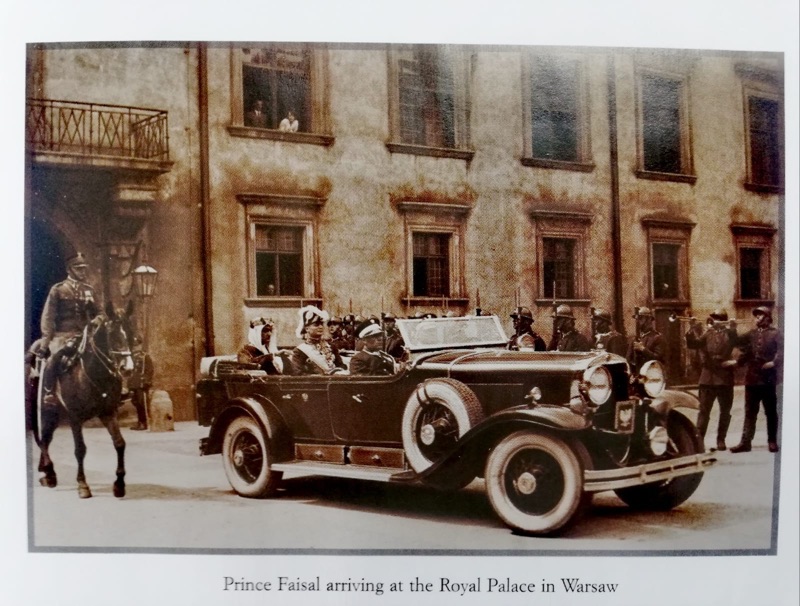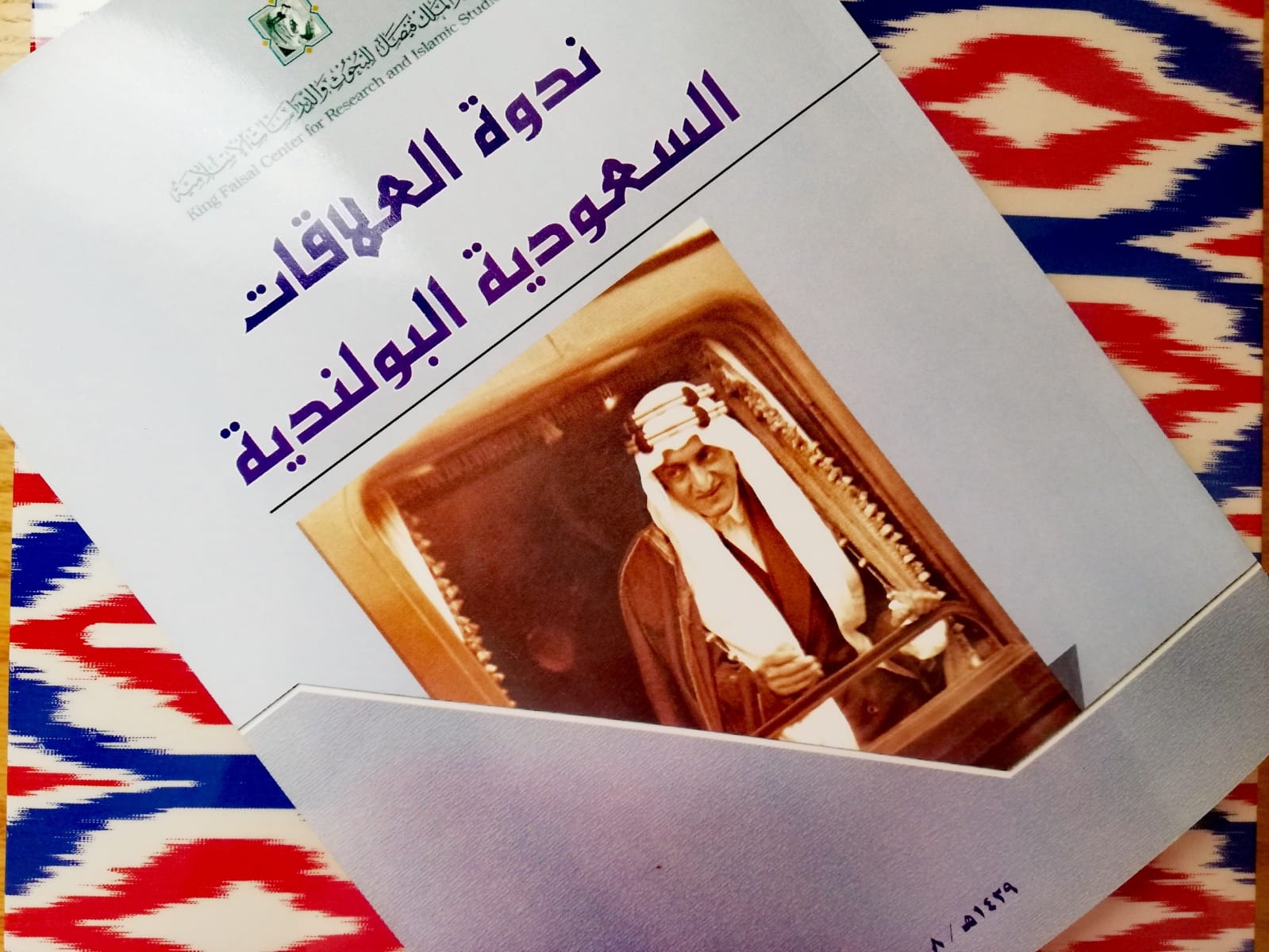Establishment of the Bilateral Relations between Poland and Saudi Arabia
01.05.2020
On the occasion of the 25th anniversary of establishing bilateral relations between the Republic of Poland and the Kingdom of Saudi Arabia (03.05.1995 - 03.05.2020), we are proud to present a series of articles and archival materials on the history of bilateral relations in the last quarter of a century and the events that led to them.

ESTABLISHMENT OF THE BILATERAL RELATIONS BETWEEN
THE REPUBLIC OF POLAND AND THE KINGDOM OF SAUDI ARABIA
The first contacts between the Republic of Poland and the Kingdom of Saudi Arabia took place in the late 1920s. However, it is worth recalling that outstanding Poles had traveled and ventured to the territory of today's Saudi Arabia much earlier. It is said that the initial contacts of Poles with Arabia took place even in the 16th century. Apparently, in the Oxford library, there is a book written by a Pole who reached Mecca in the 16th century.
In the 19th century, Arabia was visited by at least three of our compatriots (count Wacław Rzewuski, count Juliusz Dzieduszycki, and Ignacy Żagiell). W. Rzewuski (1784-1831) - also known as Emir Taj, has visited Arabia in 1817-1820. He described his travels in diaries written in French, entitled Sur Les Chevaux et Provenants des Races Orientales. The three-volume manuscript is in the National Library in Warsaw. J. Dzieduszycki (1817-1885) visited - among others - Hail region and Mount Szammar in 1844-1845. During the trip, he bought 8 horses from an Al-Rashid family. In the second half of the 19th century, Ignacy Żagiell (1826-1891) - a Polish traveler, doctor and naturalist resided in the Arabian Peninsula. Other signals about Poles are not sufficiently documented. However, there is a mention that, allegedly in 1840, during one of his trips to Hijaz, Dr. Feliks Hermanowicz was to visit his compatriot on Mount Karat (around Mecca), called Hadajad bej. He lived in a small hut at the very top of the mountain. Some sources state that the abovementioned Pole - Hedajat bej (Bonkovski bej vel Antoni Bakowski) lived in 1788-1848.
Interwar period. In June 1929, a representative of King Abdulaziz visited Warsaw. On March 11th 1930, Poland formally recognized King Abdulaziz as the ruler of Nejd, Hijaz and Dependent Territories. At that time Poland was the ninth country to establish official relations with Saudi Arabia. In May 1930, a delegation came to Jeddah, headed by Count. Edward Raczyński and Mufti of the Republic of Poland Jakub Szynkiewicz. On May 27th 1932 Prince Fajsal bin Abdulaziz paid a visit to Warsaw. He was received by Marshal Józef Piłsudski and President Ignacy Mościcki. In May 1932, King Abdulaziz received Stanisław Korwin-Pawłowski, a lecturer at the Al-Azhar University in Cairo. The state of Polish-Saudi relations in the interwar period was extensively described in the Arabic-language publication Nadwat al-alaqat as-su’udiyya al-bulandiyya [Study of Saudi-Polish Relations] published by the King Faisal Center for Research and Islamic Studies in Riyadh in 2008.
The Second World War, with subsequent communist period in Poland, for many years prevented Poles from traveling to the countries of the Arabian Peninsula, especially to Saudi Arabia. The only Poles who were at these times able to travel to the Kingdom of Saudi Arabia were emigrants who already had the citizenship of another country. In 1955, the episodic mission of good will of the Ambassador in Ankara J. Zambrowicz took place. There was also a visit of a delegation from the League of the Muslim World (1986) and a few other contacts.
Closer cooperation began after 1989. After a break of over 50 years, when Poland regained full sovereignty and independence, the official contacts between the two countries resumed. Foreign ministers began regular meetings in New York on margins of the UN sessions. Since 1990, intensive visits and contacts of both countries have been recorded in order to establish bilateral diplomatic relations.
The most important visits from representatives of the Polish state, due to establishing diplomatic relations with Saudi Arabia, must be evoke herein - starting with the working delegation of the Ministry of Foreign Affairs and Ministry of Defense of the Republic of Poland, which took place in Riyadh in November-December 1990. Delegation was headed by Director A. Majkowski and Gen. T. Cepak.
On December 16th 1990, a delegation chaired by Deputy Ministers of Foreign Affairs - J. Majewski and National Defense - J. Onyszkiewicz and WGZ - J. Kaczurby signed in Riyadh the "Agreement between the Government of the Republic of Poland and the Government of the Kingdom of Saudi Arabia on the activities of the Polish auxiliary contingent on the territory of the Kingdom of Saudi Arabia" and "Agreement between the Ministry of National Defense of the Republic of Poland and the Ministry of Defense of the Kingdom of Saudi Arabia". Important visits to developing diplomatic relations included arriving in Saudi Arabia, the Deputy Minister of Foreign Affairs and the Minister from Chancellery of the President of Poland in 1992. On May 3rd 1995, official diplomatic relations were established. In June 1998, the Polish Embassy was opened in Riyadh. In October 1999 the credentials were submitted by Ambassador Krzysztof Płomiński. In 2000 the Honorary Consulate of the Republic of Poland was opened in Jeddah headed by Sheikh Hassan Omar Attar.
Bibliography:
- Kapiszewski A. The Establishment of Polish-Saudi Relations, Kraków 2002;
- Poland-Saudi Arabia: A New Chapter Begins, Arabis vol I: No. III (03.1996);
- Woźniak-Bobińska M., Solarz A. M. Wprowadzenie do polityki zagranicznej muzułmańskich państw bliskiego wschodu i Afryki północnej. Warszawa 2018, s. 222-253;
- Nadwat al-alaqat as-su’udiyya al-bulandiyya [Studium of the Saudi – Polish Relations], King Faisal Center for Research and Islamic Studies, Riyadh 2008;
- Archival materials of the Embassy of the Republic of Poland in Riyadh.



